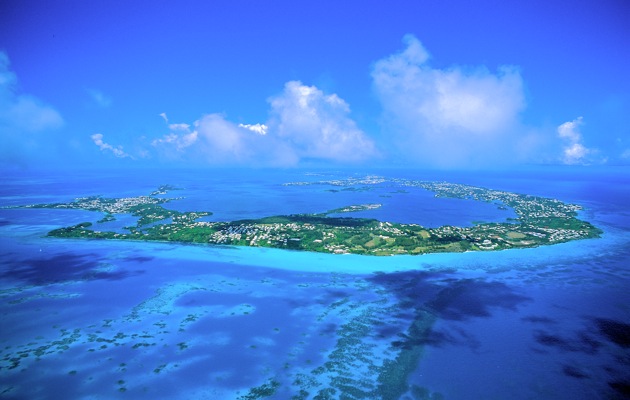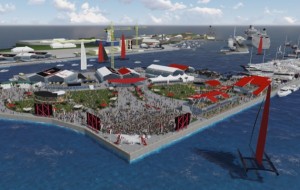The Americas Cup 2017 will be held in Bermuda. Why and what does it mean for the Cup?
The Americas Cup 2017 will take place in Bermuda.
The confirmation of the venue for the 35th Americas Cup in June 2017 was announced by the America’s Cup commercial commissioner, Dr Harvey Schiller, at a press conference in New York.
During the announcement Dr Schiller said that there would be five challenging teams; (Emirates Team New Zealand (NZ), Luna Rossa (ITA), Artemis Racing (SWE), Ben Ainslie racing (GBR) and Team France (FR)) along with the possibility of two further teams for which the Cup organisation had received ‘serious proposals’.
There was also confirmation that the World Series in 2015 would visit Portsmouth, Gothenburg, Bermuda and one more location that is yet to be announced. In 2016 the ACWS event will add Chicago to the tour.
https://www.youtube.com/watch?feature=player_detailpage&v=u73FtIFTrIw
Bermuda’s premier Michael Dunkley continued the announcement by outlining some of the details including the; ‘near perfect sailing conditions’, to the pit row for the public, the single location for all the bases and the onshore hospitality. ‘Sailing in Bermuda is a match made in heaven,’ he said.
But it was when he came to describe the broader appeal of the island that the significance of this venue announcement started to strike home.
Describing Bermuda as having ‘A dash of British charm’, must have sounded odd to many American Cup supporters. After all, this will be the first time in 166 years that the Cup will be defended by an American team outside America. Considering the time that the Auld mug was said to be bolted to a shelf in a trophy cabinet in the New York Yacht Club, it is clear how far the event has moved on since the old days of J Class and metre boats.
Interesting also that the press conference was not held in the Defending club in San Francisco that has spent so many years trying to get a hold of it, but in a hotel in New York was perhaps another indication of the new age of the AC.
A new age that started when Alinghi chose Spain as the country that it would defend this coveted trophy. With no coastline to sail on, (and a mountain of paperwork and politics to overcome in order to race for the Cup on a lake), the Swiss had to move somewhere else. But the American defenders didn’t. So why?
Dr Schiller charged through the list of reasons for going to Bermuda. “We wanted a place that has great sailing conditions so that it was exciting for the fans and challenging for the sailors. It had to support the stadium sailing concept with room for an integrated spectator experience on land and on the water. We also compared with some of the best events that had taken place in the past. Smaller venues like Newport Rhode Island and Freemantle Australia where the public fully embraced the teams and supported the event.
“As we worked through the process there was one location that stood out,” he said as he built up to the confirmation. “Bermuda.”
But the official announcement, which confirmed a rumour that has been doing the rounds for a week, is unlikely to scotch the speculation that the main reasons for choosing Bermuda were the issues of tax and television.
Mounting an America’s Cup campaign is an expensive process for a Challenger, doubly so for a Defender if they fail to do the commercial deals for covering the hosting of the Cup. One of the intentions of this Cup cycle was to reduce costs both for teams and for the event itself. Hosting an event in a tax haven is surely a good start. Taking one of the sport’s biggest events to a small territory has also been proven to draw more local attention and support than taking the same event to a huge city.
“One of the main considerations was creating one location for the entire event,” Russell Coutts told me shortly after the conference. “It was important that we could integrate the teams and their bases with the public from a venue at the centre of the racing.”
Television is another key issue that Michael Dunkley’s comments seemed to support, even if unintended. When answering a question about attracting crowds he suggested that the organisers of the Super Bowl, which he said attracts 65,000 – 75,000 people and the rest of the world who wanted to be there, would be jealous although he stopped short of giving a number for the Cup himself. It hardly mattered though. If broadcasting rights to the event are to be worth anything, the show will need to attract many times this number for television. And therein lies a key attraction of Bermuda, its time zone and proximity to Europe.
While the island is clearly hoping to welcome thousands of visitors, as far as many of us will be concerned, Bermuda will simply be the stadium for the event.
“Television and the time zones was also something that we rated pretty highly,” said Coutts. “Getting the wrong time zone isn’t going to be any good for a team, their sponsors or the event. This feels a lot better on the outside of the stadium than it’s ever been before. I think this will be the best AC yet. That’s not PR talk, I really believe it.”
Certainly the bulk of the challenging teams seem happy with the idea.
“It’s not so far from Europe so its good for our sponsor and TV,” said Team France’ Franck Cammas who could easily have been speaking for the other three European teams.
Schiller confirmed that the racing had been arranged for TV as before, with a 90 minute package which equated to two races of around 25 minutes apiece.
While he didn’t go further on timings, if the start of the first race was to be at 1400, this would be 6pm in Britain and 7pm in France and Italy, 10am in San Francisco and 1pm in New York. The timings might even work for New Zealand at 7am.
It is however the Kiwis that appear to have the biggest problem in selling the Cup to their public. As a part government funded, part sponsored team, the lure of the American market is a big attraction. Beautiful though Bermuda is, commercially it is considered to be less appealing to commerce and government, as Emirates Team New Zealand’ COO Kevin Shoebridge seemed to hint at.
“It is a fantastic venue,” he said. “Now we know where it is we will go back and immediately start working with our sponsors and the government to make sure that we’re there.”
And then there’s the issue of technology particularly for the boats. A few like Ben Ainslie and Jimmy Spithill have raced in Bermuda on several occasions, but as Ainslie pointed out his experience has been in the harbour rather than out in Great Bay.
Spithill added, “This will not be a one way track, it is a new track.”
Great though San Francisco was, the thermally driven breeze, the tide and the topography often meant that the game plan was set for the race, reducing the potential passing opportunities. The new venue could provide more options. At the very least it offers a new task for design teams.
“This time around we will be looking at weather that is much lighter than in San Francisco so we will be looking at this location very closely,” said Artemis Racing’s Nathan Outteridge.
Ainslie agreed. “It’s going to be challenging, but that’s what we want.”
Aside from the declaration of the venue there were hints at two other issues that have yet to be properly aired and that could have a bearing on how the 35th Cup pans out this time around. The first was regarding the issue of Challenger of Record (COR), a task that shifted to Luna Rossa after the Australian team withdrew their challenge. In the past the COR responsibility has been seen by some teams as a means of getting closer to the Defender in an attempt to influence the rules for the cycle, while also improving their chances of having their financial responsibilities underwritten. The reality however has frequently been that being COR is a poisoned chalice where the administrative duties cost money and cause a distraction from the team challenge itself.
Little surprise then that Luna Rossa skipper Max Sirena has been keen to set up a Challenger of Record committee to help spread the load and avoid arguments and debates that could derail the Cup cycle for all. While it’s easy to be all smiles before the racing has started, there is nonetheless an underlying spirit of co-operation that has been absent from the Cup for some time.
“I’ve never known anything like it in the Cup,” confirmed Coutts. “So far it’s been the best atmosphere I’ve ever witnessed. And one of the reasons why the negotiations have gone well is that at the competitor meetings we’ve had sailors rather than the rules advisors.”
The second detail is that of who will be regatta director. While no one Cup is created or achieved by one person, when it comes to running the show on the water and in the pit lanes there is one man who held this together last time around. According to Schiller the race director has been selected but it was too soon to announce.
Given Australia’s withdrawal, I wonder if it would be Iain Murray? Good for the Cup if it is.
2015 ACWS dates
Season opener – To be announced – June 5-7, 2015
Portsmouth, Great Britain – July 23-26, 2015
Gothenburg, Sweden – August 28-30, 2015
Hamilton, Bermuda – October 16-18, 2015





